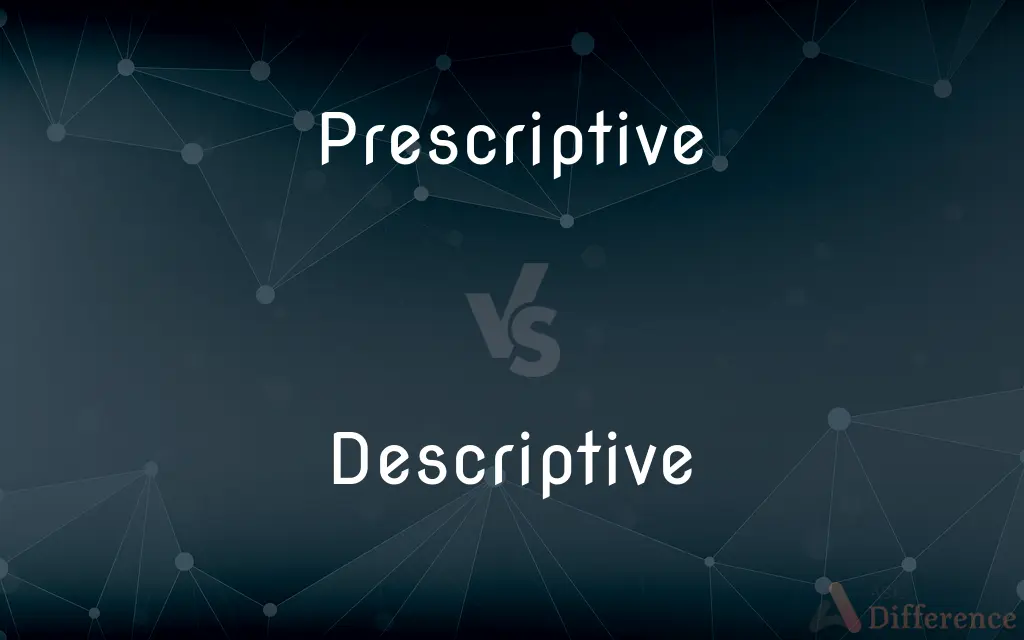Prescriptive vs. Descriptive — What's the Difference?
By Maham Liaqat & Urooj Arif — Updated on April 14, 2024
Prescriptive grammar dictates language rules and standards, focusing on correctness, whereas descriptive grammar observes and records how language is actually used.

Difference Between Prescriptive and Descriptive
Table of Contents
ADVERTISEMENT
Key Differences
Prescriptive grammar establishes rules for what is considered the "correct" use of language, aiming to standardize communication. In contrast, descriptive grammar seeks to document and analyze language as it is naturally spoken and written by people.
Prescriptive approaches are often taught in educational settings and are used to enforce traditional linguistic structures. On the other hand, descriptive grammar is employed by linguists and scholars to understand language evolution and variation.
In prescriptive grammar, deviations from established rules are usually seen as errors or incorrect usage. Descriptive grammar, however, views these variations as natural and integral parts of language diversity.
While prescriptive grammar advocates for a specific set of language rules, descriptive grammar provides a broader perspective that accommodates regional dialects and social vernaculars.
Prescriptive rules are typically based on historical language usage and the writings of earlier standard language forms. Conversely, descriptive grammar bases its findings on current, real-world language usage across different contexts and communities.
ADVERTISEMENT
Comparison Chart
Purpose
To instruct correct language usage
To observe and record natural language usage
Focus
Rules and standards
Language as it is used
Perspective on Language
Normative (how language should be)
Descriptive (how language is)
Usage in Academia
Language teaching and traditional grammar studies
Linguistic research and analysis
View on Language Change
Often resistant to change
Accepts and documents changes as they occur
Compare with Definitions
Prescriptive
Often used in formal writing and speaking.
Prescriptive rules are crucial in legal and academic contexts.
Descriptive
Focuses on language patterns and variations.
Descriptive grammar studies reveal the richness of regional accents.
Prescriptive
Advocates for maintaining linguistic purity.
Prescriptive grammar often resists incorporating slang and colloquialisms.
Descriptive
Used by linguists to analyze spoken and written language.
Linguists use descriptive grammar to understand language evolution.
Prescriptive
Defines standard language rules.
Prescriptive grammar dictates that one should not end a sentence with a preposition.
Descriptive
Reflects real-life language usage.
Descriptive grammar captures the evolving nature of language through actual usage.
Prescriptive
Taught in schools as the correct form.
School curricula typically emphasize prescriptive grammar standards.
Descriptive
Describes language without judging correctness.
Descriptive grammar does not label frequent 'mistakes' as wrong.
Prescriptive
Focuses on correctness and tradition.
In prescriptive grammar, splitting infinitives is generally frowned upon.
Descriptive
Documents how language is actually used.
Descriptive grammar includes various dialects and slang in its studies.
Prescriptive
Relating to or making rules, laws, or directions
Prescriptive pronouncements.
Descriptive
Involving or characterized by description; serving to describe.
Prescriptive
(Linguistics) Based on or establishing norms or rules indicating how a language should or should not be used rather than describing the ways in which a language is used.
Descriptive
Concerned with classification or description
A descriptive science.
Prescriptive
(Law) Of or relating to acquisition or occupancy by prescription.
Descriptive
Expressing an attribute of the modified noun, as green in green grass. Used of an adjective or adjectival clause.
Prescriptive
(Archaic) Sanctioned or authorized by long-standing custom or usage.
Descriptive
Nonrestrictive.
Prescriptive
Of or pertaining to prescribing or enjoining, especially an action or behavior based on a norm or standard.
Descriptive
(Linguistics) Of or relating to the study or the description of a language or a specific stage of a language, with emphasis on constructing a grammar without regard to historical development, comparison with other languages, or advocated norms for correct or proper usage.
Prescriptive
Consisting in, or acquired by, immemorial or long-continued use and enjoyment; as, a prescriptive right of title; pleading the continuance and authority of long custom.
The right to be drowsy in protracted toil has become prescriptive.
Descriptive
Of, relating to, or providing a description.
Prescriptive
Of or pertaining to the doctrine that acceptable grammatical rules should be prescribed by authority, rather than be determined by common usage.
Descriptive
(grammar) Of an adjective, stating an attribute of the associated noun (as heavy in the heavy dictionary).
Prescriptive
Giving directives or rules;
Prescriptive grammar is concerned with norms of or rules for correct usage
Descriptive
(linguistics) Describing the structure, grammar, vocabulary and actual use of a language.
Prescriptive
Based on or prescribing a norm or standard;
Normative grammar
Descriptive
Describing and seeking to classify, as opposed to normative or prescriptive.
Descriptive
(grammar) An adjective (or other descriptive word)
Descriptive
Tending to describe; having the quality of representing; containing description; as, a descriptive figure; a descriptive phrase; a descriptive narration; a story descriptive of the age.
Descriptive
Serving to describe or inform or characterized by description;
The descriptive variable
A descriptive passage
Descriptive
Concerned with phenomena (especially language) at a particular period without considering historical antecedents;
Synchronic linguistics
Descriptive linguistics
Descriptive
Describing the structure of a language;
Descriptive linguistics simply describes language
Common Curiosities
Can prescriptive and descriptive grammar coexist?
Yes, they serve different purposes and can complement each other in linguistic studies.
What is prescriptive grammar?
Prescriptive grammar is a set of rules intended to instruct the correct use of language.
What is descriptive grammar?
Descriptive grammar is the systematic study and representation of a language as it is actually used.
How does descriptive grammar help linguists?
It helps them understand language patterns, changes, and variations.
Why is prescriptive grammar important?
It provides a standard that facilitates clear and effective communication.
How do educational systems use prescriptive grammar?
They use it to teach standardized rules of writing and speaking.
Which is more rigid, prescriptive or descriptive grammar?
Prescriptive grammar is more rigid as it adheres to established rules.
Can prescriptive grammar change over time?
Yes, but changes are usually slow and resist deviation from traditional norms.
Why might someone study prescriptive grammar?
To learn the formal standards necessary for professional and academic communication.
Are prescriptive rules universal?
No, what is considered correct can vary between different languages and cultures.
What role does descriptive grammar play in understanding dialects?
It plays a crucial role in documenting and analyzing regional dialects.
Do linguists prefer prescriptive or descriptive grammar?
Linguists generally prefer descriptive grammar for its comprehensive view of language.
What are the criticisms of prescriptive grammar?
Critics argue that it can be too rigid and not reflective of actual language use.
Does descriptive grammar consider slang as proper language?
Yes, it documents all forms of language, including slang.
Is prescriptive grammar based on logic?
It is often based more on tradition than on logic.
Share Your Discovery

Previous Comparison
Sonogram vs. Ultrasound
Next Comparison
However vs. WhateverAuthor Spotlight
Written by
Maham LiaqatCo-written by
Urooj ArifUrooj is a skilled content writer at Ask Difference, known for her exceptional ability to simplify complex topics into engaging and informative content. With a passion for research and a flair for clear, concise writing, she consistently delivers articles that resonate with our diverse audience.
















































